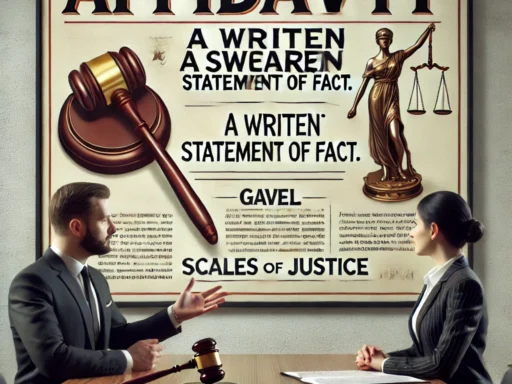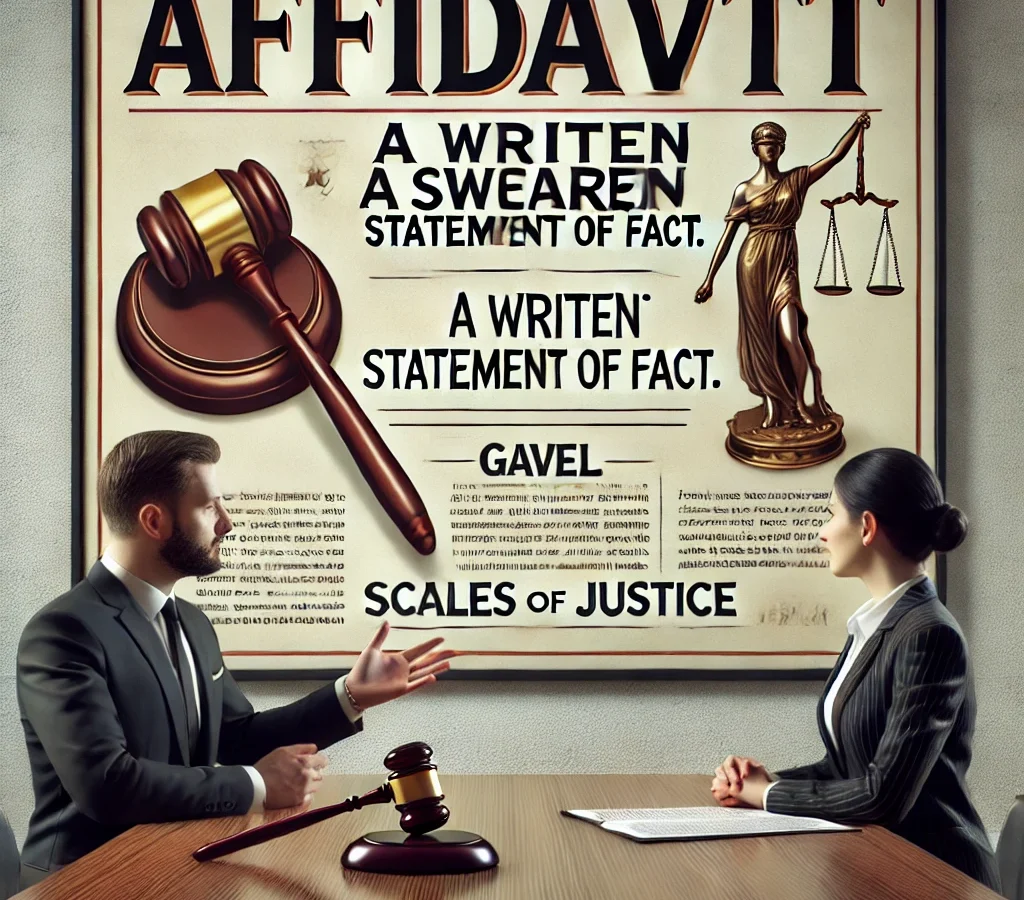When diving into the world of legal documents, the term “affidavit” often pops up, but what does it really mean? An affidavit is more than just a piece of paper; it’s a sworn statement made under penalty of perjury. This powerful tool plays a crucial role in various legal proceedings, allowing individuals to present facts and evidence formally.
Understanding the legal definition of an affidavit can simplify complex legal processes. Knowing how affidavits work is essential whether you’re involved in a court case or need to support a claim. In this article, I’ll break down the intricacies of affidavits, helping you grasp their significance and how they can impact your legal journey.
Understanding Affidavit Legal Definition
An affidavit constitutes a written statement confirmed by oath or affirmation. This document plays a vital role in various legal contexts, validating assertions made by individuals in a court of law.
What Is an Affidavit?
An affidavit is a formal document where the affiant, or the person making the statement, swears to the truthfulness of the content in front of an online notary or authorized official. Affidavits typically include essential details such as the affiant’s identity, the relevant facts, and the date when the statement is made. Standard usages of affidavits appear in areas like family law, estate planning, and civil litigation.
Importance of Affidavits in Legal Proceedings
Affidavits serve significant purposes in legal proceedings. They provide a means for parties to present evidence without needing to physically appear in court, thus streamlining processes. Affidavits can support motions, substantiate claims, and serve as essential documentation in various cases. As legally binding documents, they carry weight in court, reinforcing the credibility of the presented information. Affidavits often facilitate efficient dispute resolution, making them indispensable in the legal landscape.
Key Characteristics of an Affidavit
Affidavits possess distinct characteristics that define their function in legal contexts. Understanding these characteristics helps in utilizing affidavits correctly.
Sworn Statement
An affidavit represents a sworn statement made by an individual, known as the affiant. This statement declares the truth of specific facts under penalty of perjury. By signing the affidavit, the affiant asserts that the content is accurate and can be relied upon in legal situations. Courts often accept these sworn statements as credible evidence, provided they meet required legal standards.
Written Document
Affidavits are formal written documents that include key components. They contain the affiant’s name, the date of the statement, and a clear outline of the factual assertions. Signatures and notary public acknowledgment further validate the document, ensuring its authenticity. As written proofs, affidavits differ from verbal testimonies, offering a permanent record of the affiant’s declarations.
Personal Knowledge
Affidavits rely on the personal knowledge of the affiant. The content must stem from firsthand experience or direct observation, not hearsay or assumptions. This requirement strengthens the affidavit’s credibility, ensuring the affiant swears to facts they know to be true. Courts often scrutinize the basis of personal knowledge during legal proceedings, reinforcing the importance of accuracy in these documents.
Types of Affidavits
Affidavits serve various purposes across different legal contexts. Each type addresses specific legal requirements or circumstances, highlighting their versatility in legal proceedings.
Affidavit of Support
An affidavit of support is a legally binding document that an individual completes to accept financial responsibility for another person. Often used in immigration cases, this affidavit demonstrates that a sponsor possesses adequate income or assets to support the immigrant, ensuring they won’t rely on government assistance. The sponsor’s financial details, such as income, employment status, and relationship to the immigrant, must be clearly outlined, making this document crucial during the visa petition process.
Affidavit of Service
An affidavit of service simply means a sworn statement confirming that one party in litigation has served process on another. This will also include the date of service, method of service (personal delivery, mail), and by whom the document was served. Courts rely on the affidavit of service to ascertain whether due process is accorded to litigants or parties in a case before the court. This affidavit must be accurate, as any discrepancy will invalidate the proceedings.
Affidavit of Identity
An affidavit of identity is a notarized statement that identifies an individual for who he says he is. An “Affidavit of Identity,” also known as a bank identification affidavit, may be employed mainly in instances alleging identity fraud is committed, perhaps when identification might be non-extant or was never provided hitherto. Some personal details comprise the full where the affiant resides; the affiant will include a proper statement testifying that such address and birth correspond to them. Employ such an affidavit on the easy availability of verification: banking, courts, and governmental for the benefit of the person swearing the affiant through his own identified signature claim relating to the particulars of identity.
Common Scenarios for Using Affidavits
Affidavits play a crucial role in various legal contexts, serving as vital supporting documents. Specific scenarios often require the use of affidavits to ensure clarity and legality.
Court Cases
Affidavits are often used in court litigations to establish facts where the presence of the affiant is not required. Parties use affidavits to support or oppose motions under motions for summary judgment or temporary restraining orders. Courts consider affidavits as evidence to establish a party’s claim or defense. For example, an affidavit of the witness can provide firsthand information about necessary occurrences that took place in the case and significantly impact the decision of justiciaries.
Financial Transactions
Affidavits are also essential in financial transactions, which in most cases have to do with verifying information about either loans, transferring property, or business dealings. These may include lenders that request an under-oath affidavit of income for verification of one’s financial status. Secondly, there is a need for an affidavit of title to assure buyers that the seller indeed has the title to the property, hence protection against any other future claims. These affidavits make financial deals more open and secure, thus minimizing their likelihood of conflicts.
Immigration Processes
These affidavits often relieve immigration-related issues while proving the most important things for immigration: relation and financial sponsorship. An Affidavit of Support may accompany such visa applications when showing that an immigrant, particularly a sponsor, can get proper financial support from them. In cases where documentation cannot be attained, an Affidavit of Relationship may show the familial connection, which supports the approval of immigration petitions from their sponsor. Such forms of affidavits really make a difference in applications via credible, sworn statements that assist in proving one’s claim made towards availing immigration benefits.
Discover the Power of BlueNotary:
Integrate your Business, Title Company, or Law Firm to Satisfy your Customers and Decrease Turnaround
Get a document Notarized/Sign-up
Join the Free Notary Training Facebook Group
Conclusion
Understanding affidavits is crucial to any person dealing with the legal system. Affidavits are essential for presenting evidence and facilitating the smooth flow of any legal proceeding. Whether litigation or financial transactions, realizing how an affidavit can support one’s claim and add credence is essential.
Their versatility, ranging from immigration to identity verification, shows their importance. Knowing all the details about the affidavit will make me feel powerful and help me apply them in most legal dealings. Knowledge of these will go a long way in bringing significant changes in the outcome of court cases.








